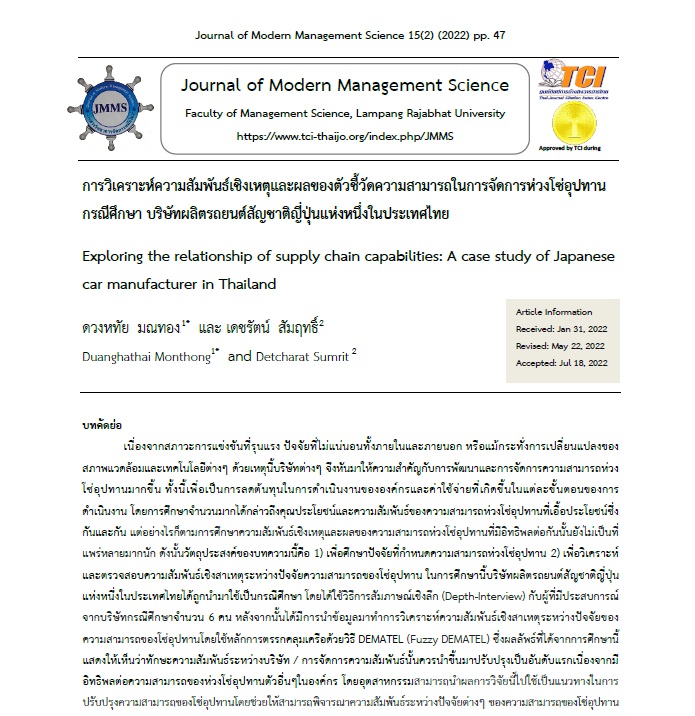การวิเคราะห์ความสัมพันธ์เชิงเหตุและผลของตัวชี้วัดความสามารถในการจัดการห่วงโซ่อุปทานกรณีศึกษา บริษัทผลิตรถยนต์สัญชาติญี่ปุ่นแห่งหนึ่งในประเทศไทย
Main Article Content
บทคัดย่อ
เนื่องจากสภาวะการแข่งขันที่รุนแรง ปัจจัยที่ไม่แน่นอนทั้งภายในและภายนอก หรือแม้กระทั่งการเปลี่ยนแปลงของสภาพแวดล้อมและเทคโนโลยีต่างๆ ด้วยเหตุนี้บริษัทต่างๆ จึงหันมาให้ความสำคัญกับการพัฒนาและการจัดการความสามารถห่วงโซ่อุปทานมากขึ้น ทั้งนี้เพื่อเป็นการลดต้นทุนในการดำเนินงานขององค์กรและค่าใช้จ่ายที่เกิดขึ้นในแต่ละขั้นตอนของการดำเนินงาน โดยการศึกษาจำนวนมากได้กล่าวถึงคุณประโยชน์และความสัมพันธ์ของความสามารถห่วงโซ่อุปทานที่เอื้อประโยชน์ซึ่งกันและกัน แต่อย่างไรก็ตามการศึกษาความสัมพันธ์เชิงเหตุและผลของความสามารถห่วงโซ่อุปทานที่มีอิทธิพลต่อกันนั้นยังไม่เป็นที่แพร่หลายมากนัก ดังนั้นวัตถุประสงค์ของบทความนี้คือ 1) เพื่อศึกษาปัจจัยที่กำหนดความสามารถห่วงโซ่อุปทาน 2) เพื่อวิเคราะห์และตรวจสอบความสัมพันธ์เชิงสาเหตุระหว่างปัจจัยความสามารถของโซ่อุปทาน ในการศึกษานี้บริษัทผลิตรถยนต์สัญชาติญี่ปุ่นแห่งหนึ่งในประเทศไทยได้ถูกนำมาใช้เป็นกรณีศึกษา โดยได้ใช้วิธีการสัมภาษณ์เชิงลึก (Depth-Interview) กับผู้ที่มีประสบการณ์จากบริษัทกรณีศึกษาจำนวน 6 คน หลังจากนั้นได้มีการนำข้อมูลมาทำการวิเคราะห์ความสัมพันธ์เชิงสาเหตุระหว่างปัจจัยของความสามารถของโซ่อุปทานโดยใช้หลักการตรรกคลุมเครือด้วยวิธี DEMATEL (Fuzzy DEMATEL) ซึ่งผลลัพธ์ที่ได้จากการศึกษานี้แสดงให้เห็นว่าทักษะความสัมพันธ์ระหว่างบริษัท / การจัดการความสัมพันธ์นั้นควรนำขึ้นมาปรับปรุงเป็นอันดับแรกเนื่องจากมีอิทธิพลต่อความสามารถของห่วงโซ่อุปทานตัวอื่นๆในองค์กร โดยอุตสาหกรรมสามารถนำผลการวิจัยนี้ไปใช้เป็นแนวทางในการปรับปรุงความสามารถของโซ่อุปทานโดยช่วยให้สามารถพิจารณาความสัมพันธ์ระหว่างปัจจัยต่างๆ ของความสามารถของโซ่อุปทานได้ และถึงแม้ว่าการศึกษานี้จะได้ทำการศึกษาเฉพาะบริษัทผลิตรถยนต์สัญชาติญี่ปุ่นแห่งหนึ่งในประเทศไทยเท่านั้น แต่กรอบแนวความคิดที่ได้นำเสนอขึ้นมานี้ สามารถนำไปประยุกต์ใช้กับอุตสาหกรรมอื่นๆ ที่มีความคล้ายคลึงได้
Article Details

อนุญาตภายใต้เงื่อนไข Creative Commons Attribution-NonCommercial-NoDerivatives 4.0 International License.
บทความจะต้องผ่านการพิจารณายอมรับให้ตีพิมพ์ได้โดยกองบรรณาธิการของวารสารการจัดการ คณะวิทยาการ มหาวิทยาลัยราชภัฎลำปาง และได้รับการตรวจอ่านโดยผู้ทรงคุณวุฒิ(Peer review) และผู้เขียนบทความต้องปรับปรุงตามข้อเสนอแนะหากมีก่อนตีพิมพ์ บทความที่ไม่ผ่านการพิจารณา กองบรรณาธิการจะแจ้งให้ทราบผลการพิจารณา แต่จะไม่ส่งต้นฉบับคืนผู้เขียน
วารสารวิทยาการจัดการสมัยใหม่ คณะวิทยาการจัดการ มหาวิทยาลัยราชภัฏลำปาง ตีพิมพ์เผยแพร่ทั้งฉบับพิมพ์และฉบับออนไลน์ เราอนุญาตให้นำบทความไปใช้ประโยชน์ทางวิชาการได้ ภายใต้ขอบเขตของกฏหมายลิขสิทธิ์
เอกสารอ้างอิง
Afshan, N., Chatterjee, S. & Chhetri, P. (2018). Impact of information technology and relational aspect on supply chain collaboration leading to financial performance A study in Indian context. Benchmarking: An International Journal, 25(7), 2496-2511.
Aitken, J., Bozarth C. & Garn, W. (2016). To eliminate or absorb supply chain complexity: a conceptual model and case study. Supply Chain Management: An International Journal, 21(6), 759-774.
Alexander, K. (1992). Facilities Risk Management. Facilities, 10(4), 14-18.
Alsaad, A.K., Yousif, K.J. & Aljedaiah, M.N. (2018). Collaboration: the key to gain value from IT in supply chain. EuroMed Journal of Business, 13(2), 214-235.
Barrutia, J.M. & Echebarria, C. (2015). Resource-based view of sustainability engagement. Global Environmental Change, 70-82.
Baz, J.E. & Ruel, S. (2020). Can supply chain risk management practices mitigate the disruption impacts on supply chains’ resilience and robustness? Evidence from an empirical survey in a COVID-19 outbreak era. International Journal of Production Economics, 233, 1-12.
Cao, M., Vonderembse, M.A., Zhang, Q. & Nathan, T.S. (2009). Supply chain collaboration: conceptualization and instrument development. International Journal of Production Research, 48(22), 6613-6635.
Cao, M., & Zhang, Q. (2010). Supply chain collaboration: Impact on collaborative advantage and firm performance. Journal of Operations Management, 29(3), 163-180.
Dekkers, R., Boer, R.D., Gelsomino, L.M., Goeij, C.D., Steeman, M., Zhou, Q., Sinclair, S. & Souter, V. (2020). Evaluating theoretical conceptualisations for supply chain and finance integration: A Scottish focus group. International Journal of Production Economics, 220.
Dey, P.K., Luque, R.A. & Lopez, C.M. (2012). Supply chain integration framework using literature review. The Management of Operations, 24(8), 800-817.
Doepgen, M., Clauss, T., Kraus, S. & Cheng, C. (2020). Knowledge management capabilities and organizational risk-taking for business model innovation in SMEs. Journal of Business Research, 130, 683-697.
Ganbold, O., Matsui, Y. & Rotaru, K. (2019). Effect of information technology-enabled supply chain integration on firm’s operational performance. Journal of Enterprise Information Management, 34(3), 948-989.
Gunasekaran, A., Subramanian, N. & Rahman, S. (2017). Improving supply chain performance through management capabilities. Production Planning & Control The Management of Operations, 28(6), 473-477.
Hao, H., Wu, X. & Li, H. (2012). Research on the Collaborative Plan of Implementing High Efficient Supply Chain. 2012 International Conference on Future Energy, Environment, and Materials, 1118-1123.
Hendijani, R. & Saei R.S. (2020). Supply chain integration and firm performance: the moderating role of demand uncertainty. Cogent Business & Management, 7, 1-21.
Jarratt, D. (2008). Testing a theoretically constructed relationship management capability. European Journal of Marketing, 42(9), 1106-1132.
Kazancoglu, Y. & Ozen, Y. (2017). Analyzing workforce 4.0 in the fourth industrial revolution and proposing a road map from operations management perspective with fuzzy DEMATEL. Journal of Enterprise Information Management, 31(6), 891-907.
Lee, O. -K. D., Choi, B. & Lee, H. (2019). How do knowledge management resources and capabilities pay off in short term and long term?. Information & Management, 57(2).
McKenna, S.D. (1999). Maps of complexity and organization learning. The Journal of Development Management, 18(9), 772-793.
Mishra, B., Rolland, E., Satpathy, A. & Moore, M. (2019). A framework for enterprise risk identification and management: the resource-based view. Managerial Auditing Journal, 34(2), 162-188.
Nudurupati, S., Garengo, P. & Bititci, U. (2020). Impact of the changing business environment on performance measurement and management practices. International Journal of Production Economics, 232, 1-15.
Omotunde, O. & Alegbeleye, G. (2021). Talent management practices and job performance of librarians in university libraries in Nigeria. The Journal of Academic Librarianship, 47(2), 1-13.
Prajogo, D. & Olhager, J. (2012). Supply chain integration and performance: The effects of long-term relationships, information technology and sharing, and logistics integration. International Journal of Production Economics, 135(1). 514-522.
Rivard, S., Raymond, L. & Verreault, D. (2006). Resource-based view and competitive strategy: An integrated model of the contribution of information technology to firm performance. Journal of Strategic Information Systems, 15(1), 29-50.
Robinson, J. C. & Malhotra, K. M. (2004). Defining the concept of supply chain quality management and its relevance to academic and industrial practice. International Journal of Production Economics, 96(3) 315-337.
Schmidt, C.G. & Wagner, S.M. (2019). Blockchain and supply chain relations: A transaction cost theory perspectives. Journal of Purchasing and Supply Management, 25(4).
Silvestre, H.C. & Gomes, R.C. (2017). A resource-based view of utilities: The key-determinant factors for customer process and organizational costs in the Portuguese water industry. Water Resources and Economics, 19, 41-50.
Simatupang, T. & Sridharan, R. (2005). Benchmarking supply chain collaboration An empirical study. Benchmarking An International Journal, 11(5), 484-503.
Swanepoel, K.T. (2004). Decision support system: real-time control of manufacturing processes. Journal of Manufacturing Technology Management, 15(1), 68-75.
Vactor, J. (2011). A case study of collaborative communications within healthcare logistics. Leadership in health Services, 24(1), 51-63.
Vlachos, L.P. (2016). Reserve logistics capabilities and firm performance: the mediating role of business strategy. International Journal of Logistics Research and Applications, 19(5), 424-442.
Yasminm, M., Tatoglu, E., Kilic, H.S., Zaim, S. & Delen, D. (2020). Big data analytics capabilities and firm performance: An integrated MCDM approach. Journal of Business Research, 114, 1-15.
Yeh, C., Lee, G. & Pai, J. (2012). How information system capability affects e-business information technology strategy implementation An empirical study in Taiwan. Business Process Management Journal, 18(2), 197-218.
Yu, W., Chavez, R., Jacobs, M.A. & Feng, M. (2018). Data-driven supply chain capabilities and performance: A resource-based view. Transportation Research Part E, 114, 371-385.
Zolkiewski, J. & Turnbull, P. (2002). Do relationship portfolios and networks provide the key to successful relationship management. Journal of Business & Industrial Marketing, 17(7), 575-597.


